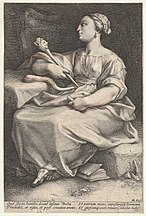Thalia (Muse)
(Redirected from
Thalia (muse)
)| Thalia | |
|---|---|
Goddess of Comedy | |
| Member of the Corybantes |

In
Ancient Greek: θάλλειν, thállein; "to flourish, to be verdant"), also spelled Thaleia, was one of the Muses, the goddess who presided over comedy and idyllic poetry. In this context her name means "flourishing", because the praises in her songs flourish through time.[4]
Appearance
Thalia was portrayed as a young woman with a joyous air, crowned with ivy, wearing boots and holding a comic mask in her hand. Many of her statues also hold a
ivy
.
Family
Thalia was the daughter of
Corybantes.[5]
Gallery
-
"David Garrick between Tragedy and Comedy" by Joshua Reynolds (1760). Thalia is pictured left, and Melpomene to the right
-
Engraving by Hendrick Goltzius (1558–1617)
-
Portrait of Françoise-Marie-Jeanne Picquefeu de Longpré, as Thalia, Muse of Comedy Louis-Michel van Loo (1765–1766)
-
(1739)
See also
Notes
- ^ "Thalia". Oxford English Dictionary (Online ed.). Oxford University Press. (Subscription or participating institution membership required.)
- ^ "Thalia Definition & Meaning - Merriam-Webster".
- ^ "Home : Oxford English Dictionary".
- ^ "Thalia | Greek mythology | Britannica". www.britannica.com. Retrieved 2022-10-26.
- ^ Apollodorus, 1.3.4. Other ancient sources, however, gave the Corybantes different parents (see Frazer, n. 2 on 1.3.4).
References
- .
- Grimal, Pierre, The Dictionary of Classical Mythology, Wiley-Blackwell, 1996, .
- Smith, William; Dictionary of Greek and Roman Biography and Mythology, London (1873). "Thaleia" 1.
External links
 Media related to Thalia at Wikimedia Commons
Media related to Thalia at Wikimedia Commons- Warburg Institute Iconographic Database




